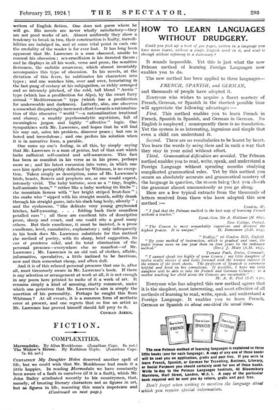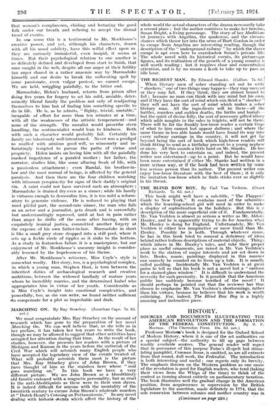FICTION.
COMPLEXITIES.
CERTAINLY My Daughter Helen -deserved another spell of life, but we could wish that Mr. Monkhouse had made it a little happier. In reading Marmaduke *6 have constantly been aware of a fault in ourselves (if it is a fault), which Mr.
John Bailey attributed recently to his countrymen, that, namely, of treating literary characters not as figures in art, but as figures in life, resenting this man's impotence and
(Continued on next page.)
that woman's complacence, chiding and lecturing the good folk under our breath and refusing to accept the dismal trend of events.
In one sense this is a testimonial to Mr. Monkhouse's creative power, and yet, although his characters, drawn with all his usual subtlety, have this wilful effect upon us they are curiously immaterial, even insipid, it seems at times. But their psychological relation to one another is so delicately defined and developed from start to finish, that once caught in the web, despite all our anger at their futility (an anger shared in a rather anaemic way by Marmaduke iimself) and our desire to break the suffocating spell by some passionate, even vulgar protest, we cannot escape. We arc held, wriggling painfully, to the bitter end.
Marmaduke, Helen's husband, returns from prison after doing five years for forgery to set his mild, amiable, deter- minedly liberal family the problem not only of readjusting themselves to him but of finding him something specific to do in life. He is, as he admits, " flighty, trivial, unstable," incapable of effort for more than ten minutes at a time, with all the weaknesses of the artistic temperament—and none of the strength. The moralist would prescribe stern handling, the sentimentalist would lean to kindness. Both with such a character would probably fail. Certainly his family are laboriously well-intentioned. Never was a prodigal so muffled with anxious good will, so winsomely and in- furiatingly tempted to pursue the paths of virtue and propriety. Helen insists on loving him with all the painfully masked impatience of a puzzled mother ; her father, the narrator, studies him, like some alluring freak of life, with a passionless attachment ; even Randal, his brother-in- law and the most normal of beings, is affected by the general paralysis. And then there are the four children watching with inhuman perspicacity for signs of their daddy's original sin. A saint could not have survived such an atmosphere ; Marmaduke is drained dry even as a sinner; while his family is virtuous enough to demoralize him, it is too mild a reform- atory to generate violence. He is reduced to playing that most pitiful part, the second-rate sinner, the man who fails as an actor and a journalist, gets drunk and is sorrowfully but understandingly reproved, until at last in pain rather than anger lie drifts off the scene after having, with an exquisitely ironical justica, committed another forgery at the expense of his own father-in-law. Marmaduke in short is like a small grey stone dropped .into a still pool, where it sets up a feeble circle of ripples as it sinks to the bottom. As a study in featureless failure it is a masterpiece, but our enjoyment of Mr. Monkhouse's uncanny insight is consider- ably lessened by the hopelessness of his theme.
After Mr. Monkhouse's reticence, Miss Coyle's style is somewhat woolly. Her story, too, is a piychological complex, in which a young man, Stephen Host, is torn between the inherited duties of archaeological research and creative ambitions, between the widowed landlady of mature years whom he incredibly marries, and the determined Isabel who appropriates him in virtue of her youth. Considerable as is Miss Coyle's insight into emotional complexities, and powerfully, too, as she can write, we found neither sufficient tto compensate for a plot so improbable and drab.











































 Previous page
Previous page